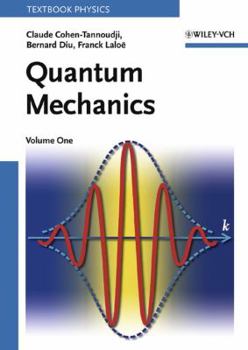Book Overview
Customer Reviews
Rated 5 starsComprehensive, and clear
I do not understand the reviewers who claim this book gives no exercises or good examples. These books are about the only graduate-level QM books which do. Not only that, they explore more interesting/complex material in their "complements" at the end of each chapter. This is far more than can be said of a book like Sakurai's, say, which is also a standard text. As someone who likes a little bit of rigor, and a lot of explicit...
0Report
Rated 5 starsThe authoritative text accesible to beginners and challenging for graduates alike
A very easy introduction to quantum mechanics with supplementary topics designed to complement the basic chapters expanding the material to cover advanced topics such as phonons, etc. Mathematical formulation is gradually brought to light after the basic ideas are explored. The level of mathematical rigour is adequate with appendices as needed. A degree of vector calculus and linear algebra is presumed but more advanced topics...
0Report
Rated 5 starsThe best out there
The authors, well-known contributors to the field of quantum optics, have given in these 2 volumes probably the best overview of quantum mechanics at the first-year graduate level. Having used these books both as a graduate student and as a lecturer, I have found that there are not too many things in the book that I find in any way troubling. The only minus might be the number of exercises: there are really not enough that...
0Report
Rated 5 starsAs complete as a book on QM can get
This book starts from scratch and works through every aspects of QM someone who studies QM is supposed to know. My advice would be to read every single line of this book, including the small print explanations and the complements. You'll be amazed at what you'll learn.
0Report
Rated 5 starsSimply the BEST (and the most expensive)
This is, in my opinion, the best introductory book on non-relativistic quantum mechanics. It starts from the very basics, either on physical or mathematical aspects. It has a wonderful collection of worked out problems where one can really understand the lectures. It's also a great reference.I just can't figure out Why it is so expensive. I believe I bought it 2 years ago by half the price. (First-hand). Anyway, a must...
0Report












